
Southwark Council's shameful response to the government's refusal to grant it a compulsory purchase order (CPO) application against Aylesbury estate leaseholders, will be to try to overturn the decision through the courts. Southwark's Cabinet met on Tuesday and agreed to seek a judicial review of the Secretary of State, Sajid Javid's decision. Experienced observers attending the meeting noted that some members of the committee had some reservations, Cllr Livingstone in particular, who suggested that it would be sensible to get legal counsel's opinion before approving what could be a costly and futile legal challange - a prudent course of action from the Council's point of view, which may explain why it has not happened.
Coincidentally, the same meeting also received a deputation from the Aylesbury Leaseholders Action Group, who led the battle against the CPO, and who have now proposed non-binding arbitration to help resolve disputed valuations. Southwark reluctantly agreed to this, while also making it plain that it is going to continue the demolition programme - around the remaining leaseholders' homes if need be.
Notting Hill Housing's demand for more money, backed up by the threat to halt progress on the Aylesbury scheme was also on the agenda (see our last blog post). Southwark was more generous to Notting Hill, approving the allocation of £21m towards demolition and other ongoing costs. The Cabinet report confirms that the £21m will come from the Council's Housing Revenue Account and 'recognises that there will be some knock-on impact on other housing investment projects' - i.e. repairs and work on other council estates. To round off a good night, the meeting was enlivened by a half-hour long protest by Sisters Uncut, demanding council housing for victims of domestic abuse.
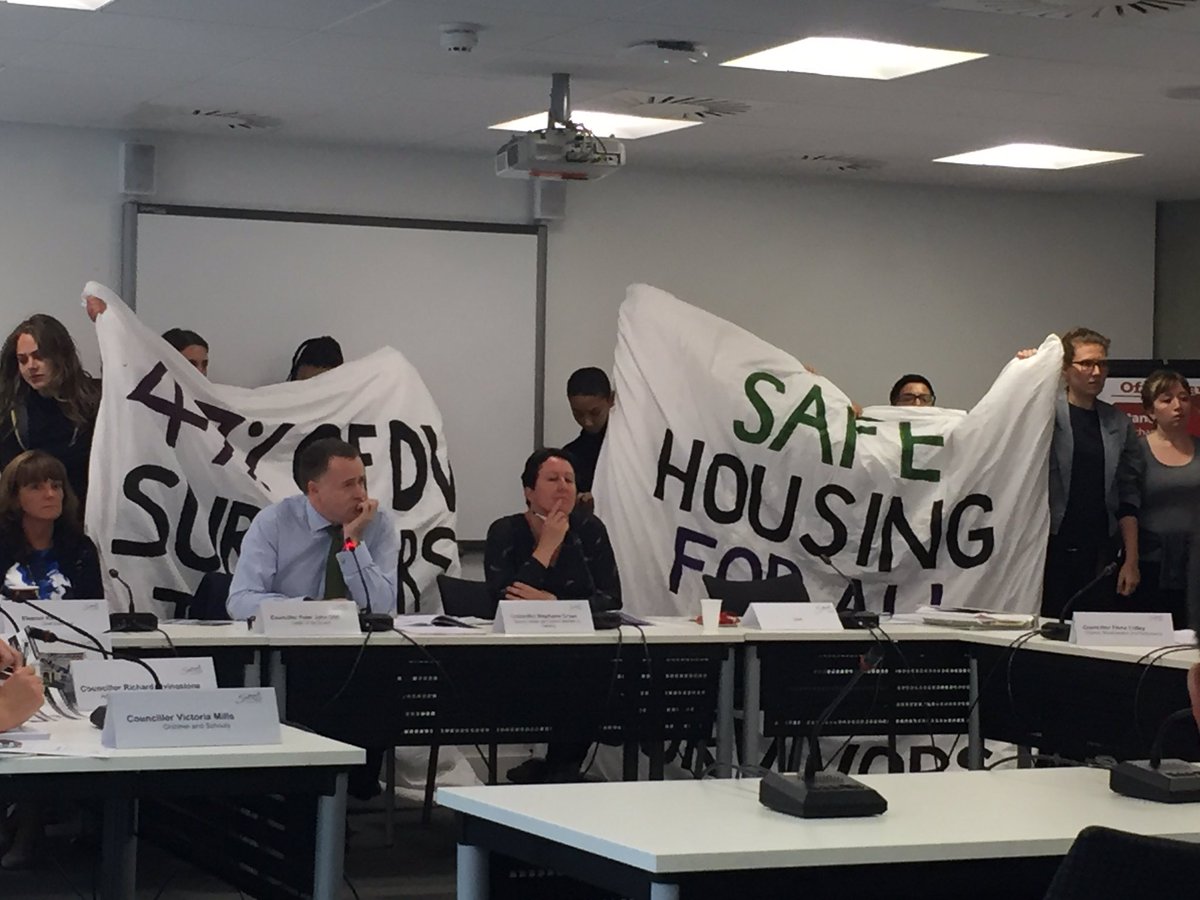
Par for the course
Southwark has justified its recourse to the courts by referring to a change of leaseholder policy in Dec 2015, but ignored, it claims, by the Secretary of State. He may feel he had reason to do so though, given that the change in policy was made several months after the CPO inquiry ended in Oct 2015. Council leader Peter John also makes much of the shared equity deal offered to leaseholders, 'rent-free'. Leaseholders say that this will only give them a fraction of the value of a property, not ownership and that there are 'lots of nasties' in the detail eg; no rent on unowned portion of home, but full service charges; no right of succession in the event of the leaseholder's death; and first refusal on the sale of the property reserved by Notting Hill. Little wonder then that so few have taken up the deal.
Aside from the shortcomings of these face-saving justifications, Southwark appears blind to the greater significance of the Secretary of State's decision. His grounds are that Southwark has failed in its public sector duty towards its elderly residents from black and minority ethnic (BME) backgrounds. This is a dreadful indictment of a Labour council to come from a right-wing Tory minister.
Nor is it the first time that such a judgement has been passed on Southwark. Its treatment of the Elephant & Castle's BME shopping centre traders was criticised by Lord Herman Ouseley in a report commissioned by Ken Livingstone after complaints from the traders. It followed a damning judgement, after complaints from the owners of Imperial Gardens, an entertainment venue in Camberwell. More recently Southwark was slated by a High Court judge in a Peckham eviction case, to which Southwark responded by claiming that the judge was "clearly wrong" and “the trial itself was unjust”. The recurring theme of these cases is the mistreatment of people from BME backgrounds. Whether they are traders, leaseholders or tenants, Southwark evidently regards them as marginal and not worth too much worry. It made the usual 'lessons have been learned' noises after the shopping centre and Imperial Gardens cases, but the CPO decision shows that in fact nothing has been learned.
Bridging the gap
There could be another reason for Southwark's panicked dash to the courts though, which is that the finances of the regeneration rely on keeping compensation levels to a minimum. Southwark halved the original compensation budget from £130m to £65M, as a result of objections from the planning inspectorate that the Aylesbury Area Action Plan wasn't viable, but around 300 leaseholders remain on the estate and they will no doubt be looking for higher compensation than that paid so far, with consequent effects on the financial viability of the scheme, which is calculated on very fine margins.
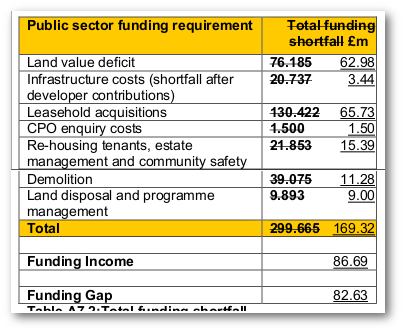 Extract from Table of Changes proposed for adoption of the Aylesbury Area Action Plan
Extract from Table of Changes proposed for adoption of the Aylesbury Area Action Plan
The business case for a moratorium
The CPO decision means that the time has come for a moratorium on Southwark Council's council estate regeneration programme. The Council has already spent £47m on the Aylesbury regeneration scheme and is due to spend a further £52m over the next 3 years alone - a staggering £99m before the scheme has even really got off the ground.
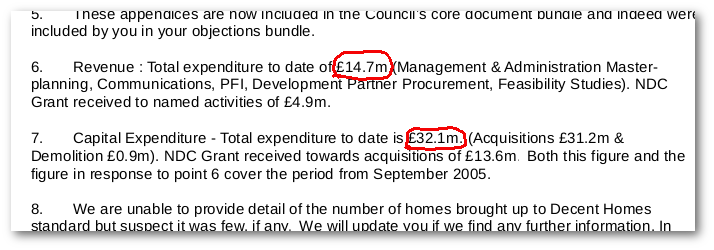 CPO Inquiry correspondence from the Council confirming expenditure on scheme to date
CPO Inquiry correspondence from the Council confirming expenditure on scheme to date
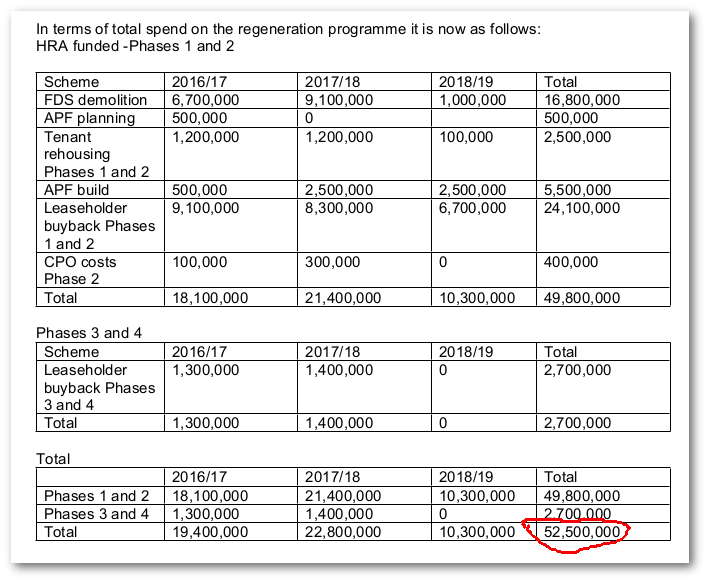 Extract from the Sep 2016 Cabinet report showing estimated expenditure over next 3 yrs
Extract from the Sep 2016 Cabinet report showing estimated expenditure over next 3 yrs
In return for all this expenditure we are losing 2,249 council homes and the 4,000 new properties being built to replace them will have anything between 778 and 1,166 fewer social rented homes than the old Aylesbury. (We're charitably assuming that the replacement social housing won't be switched to affordable rents at up to 80% market rent as Notting Hill Housing has done elsewhere).
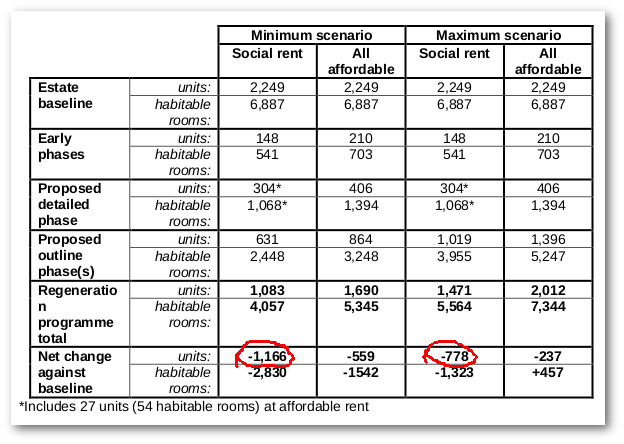 Extract from Planning Committee report for Aylesbury masterplan
Extract from Planning Committee report for Aylesbury masterplan
While Southwark is spending, development partner Notting Hill Housing is looking forward to a healthy payday. The scheme's viability assessment (disclosed after the Information Commissioner upheld our complaint) reveals that Notting Hill will make a minimum (guaranteed) 21% profit from the scheme, expected to be £163m. Southwark meantime will receive staged landpayments calculated as a residual value, after scheme costs and Notting Hill's 21% profit have been deducted[^1]. The assessment shows that this is currently expected to be £51m - just less than the next 3 years committed expenditure.  Extract from Notting Hill's viability assessment for the Aylesbury redevelopment
Extract from Notting Hill's viability assessment for the Aylesbury redevelopment
This all adds adds up to a compelling case for a moratorium, to allow stock to be taken of just exactly what has been spent and whether it might not be spent in a better way, reconsidering all options. It would for instance cost only £30m to bring the remaining 1500 council homes on the Aylesbury up to Decent Homes Standard (Southwark is spending £12m doing this for 611 homes on the estate, a pro-rata cost of £20k per home - info based on invoices issued to leaseholders).
Conclusion
The CPO decision throws some light on how badly the Aylesbury leaseholders are being treated, but the truth is that every resident of the estate is being badly treated and few will benefit from the promised new homes. The figures also show that Southwark is spending a great deal and getting very little in return that will benefit those most in housing need.
Southwark must therefore ask itself a basic question - is this really the best way to spend its money? Wouldn't it be better spent maintaining existing council homes and building new ones elsewhere in the borough?
Southwark should abandon any thoughts of appealing the CPO decision. There should instead be a moratorium on council estate regeneration, during which it must consider the grounds of the Secretary of State's verdict. There must be root and branch reform of the relevant Council departments to ensure that Southwark is never stained again by the judgement that it has failed members of our community from black and ethnic minority backgrounds.
Southwark should also take the lead of the Aylesbury Leaseholders Action Group, who, unlike the Council, have shown themselves to be reasonable and fair in their negotiating approach and true representatives of leaseholders' interests.
Finally, if despite all good arguments to the contrary, Southwark is determined to be obstinate and does appeal against the CPO decision, we think it should publish its legal advice on the chances of a successful challenge.
Footnotes:
[^1]: See paragraphs 26 and 27 of this Executive report which say that a fixed land receipt has been agreed for the First Development Site (stated as £17.5m in the viabilitiy assessment) but that land receipts for remaining phases will be calculated on a residual basis.